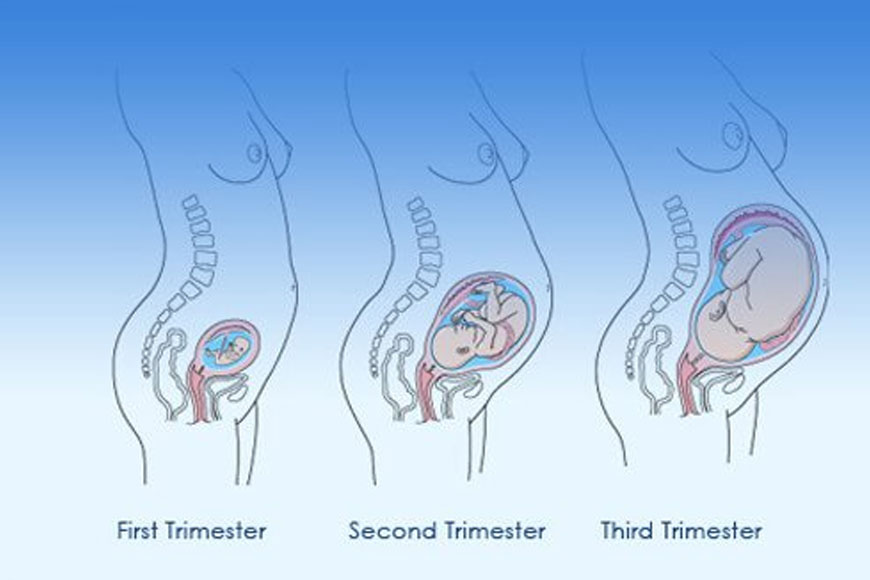
Pregnancy duration is calculated in weeks. It is considered as 40 weeks and is calculated from your first day of last menstrual period (LMP). The expected date of delivery is calculated by adding 9 months and 7 days to the LMP. The 40 weeks duration is divided into three trimesters, each of which is marked by specific fetal developments.
First Trimester (0 to 13 Weeks)
Second Trimester (14 to 26 Weeks)
Third Trimester (27 to 40 Weeks)
A pregnancy is considered term at 37 completed weeks; infants delivered before the end of week 37 are considered premature. Premature infants may have problems with their growth and development, as well as difficulties in breathing.

First Trimester (0 to 13 Weeks):
The first trimester is the most crucial to your baby’s development. During this period, your baby’s body structure and organ systems develop. Most miscarriages and birth defects occur during this period.
Your body also undergoes major changes during the first trimester. These changes often cause a variety of symptoms, including nausea, fatigue, breast tenderness and frequent urination. Although these are common pregnancy symptoms, every woman has a different experience. For example, while some may experience an increased energy level during this period, others may feel very tired and emotional.
Second Trimester (14 to 26 Weeks):
The second trimester of pregnancy is often called the “golden period” because many of the unpleasant effects of early pregnancy disappear. During the second trimester, you’re likely to experience decreased nausea, better sleep patterns and an increased energy level.
However, you may experience a whole new set of symptoms, such as back pain, abdominal pain, leg cramps, constipation, and heartburn.
Somewhere between 16 weeks and 20 weeks, you may feel your baby’s first fluttering movements.
Third Trimester (27 to 40 Weeks):
You have now reached your final stretch of pregnancy and are probably very excited and anxious for the birth of your baby. Some of the physical symptoms you may experience during this period include shortness of breath, hemorrhoids, urinary incontinence, varicose veins and sleeping problems.
Why is nutrition during pregnancy important?
Eating well is one of the best things you can do during pregnancy. Good nutrition helps you handle the extra demands on your body as your pregnancy progresses. The goal is to balance getting enough nutrients to support the growth of your fetus and maintaining a healthy weight. You can also take guidance of Clinical Nutrition during pregnancy period.
How much should I eat during pregnancy?
The popular saying is that pregnant women “eat for two,” but now we know that it’s dangerous to eat twice your usual amount of food during pregnancy. Instead of “eating for two,” think of it as eating twice as healthy.
If you are pregnant with one fetus, you need an extra 340 calories per day starting in the second trimester (and a bit more in the third trimester). That’s roughly the calorie count of a glass of skim milk and half a sandwich. Women carrying twins should consume about 600 extra calories a day, and women carrying triplets should take in 900 extra calories a day.
Why should I take a prenatal vitamin?
Vitamins and minerals play important roles in all your body functions. Eating healthy foods and taking prenatal vitamin every day should supply all the vitamins and minerals you need during pregnancy.
How much weight should I gain during pregnancy?
Weight gain depends on your health and your body mass index (BMI) before you were pregnant. If you were underweight before pregnancy, you should gain more weight than a woman who had a normal weight before pregnancy. If you were overweight or obese before pregnancy, you should gain less weight. The amount of weight gain differs by trimester:
During your first 12 weeks of pregnancy—the first trimester—you might gain only 1 to 5 pounds or none at all.
If you were a healthy weight before pregnancy, you should gain a half-pound to 1 pound per week in your second and third trimesters.


